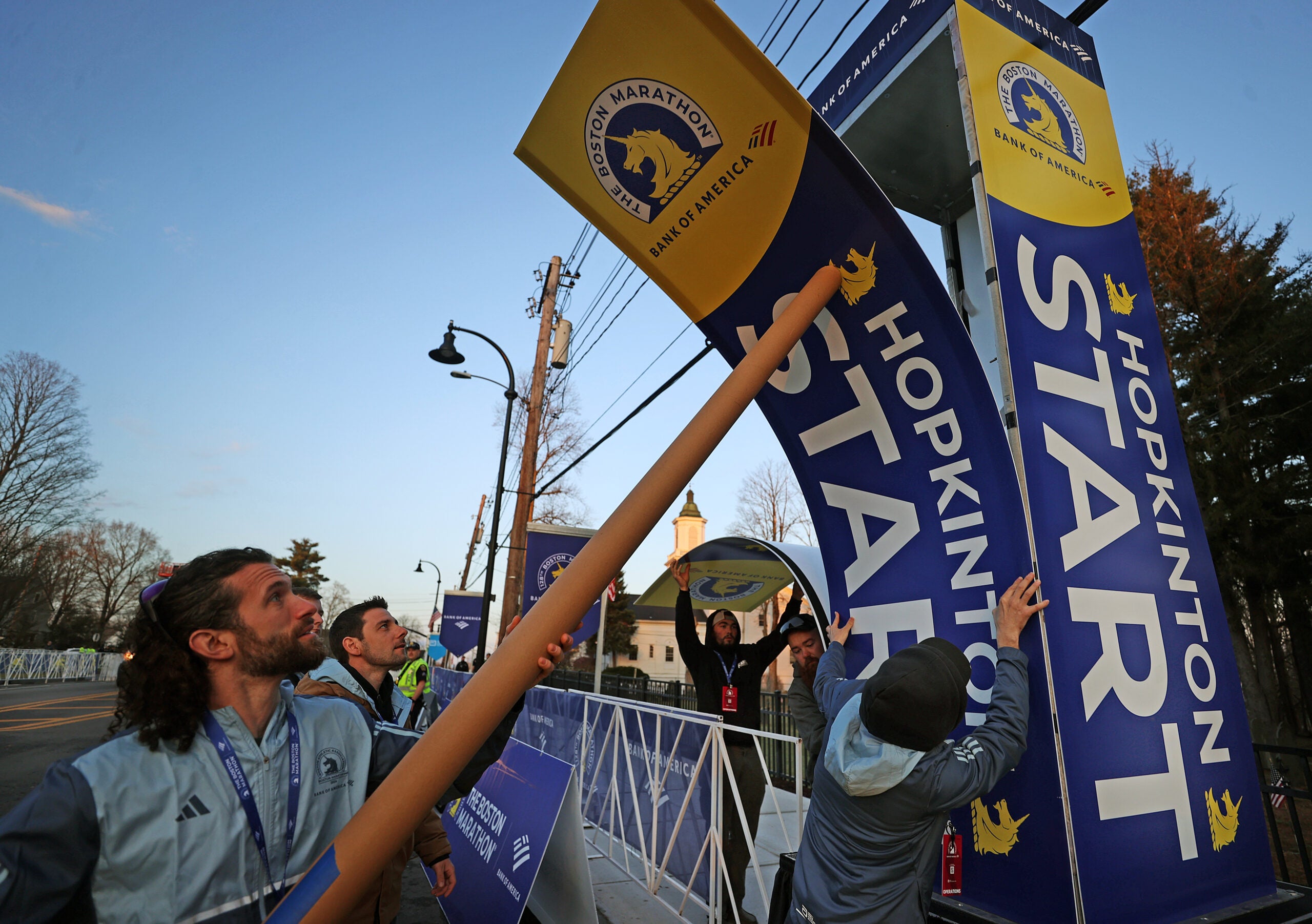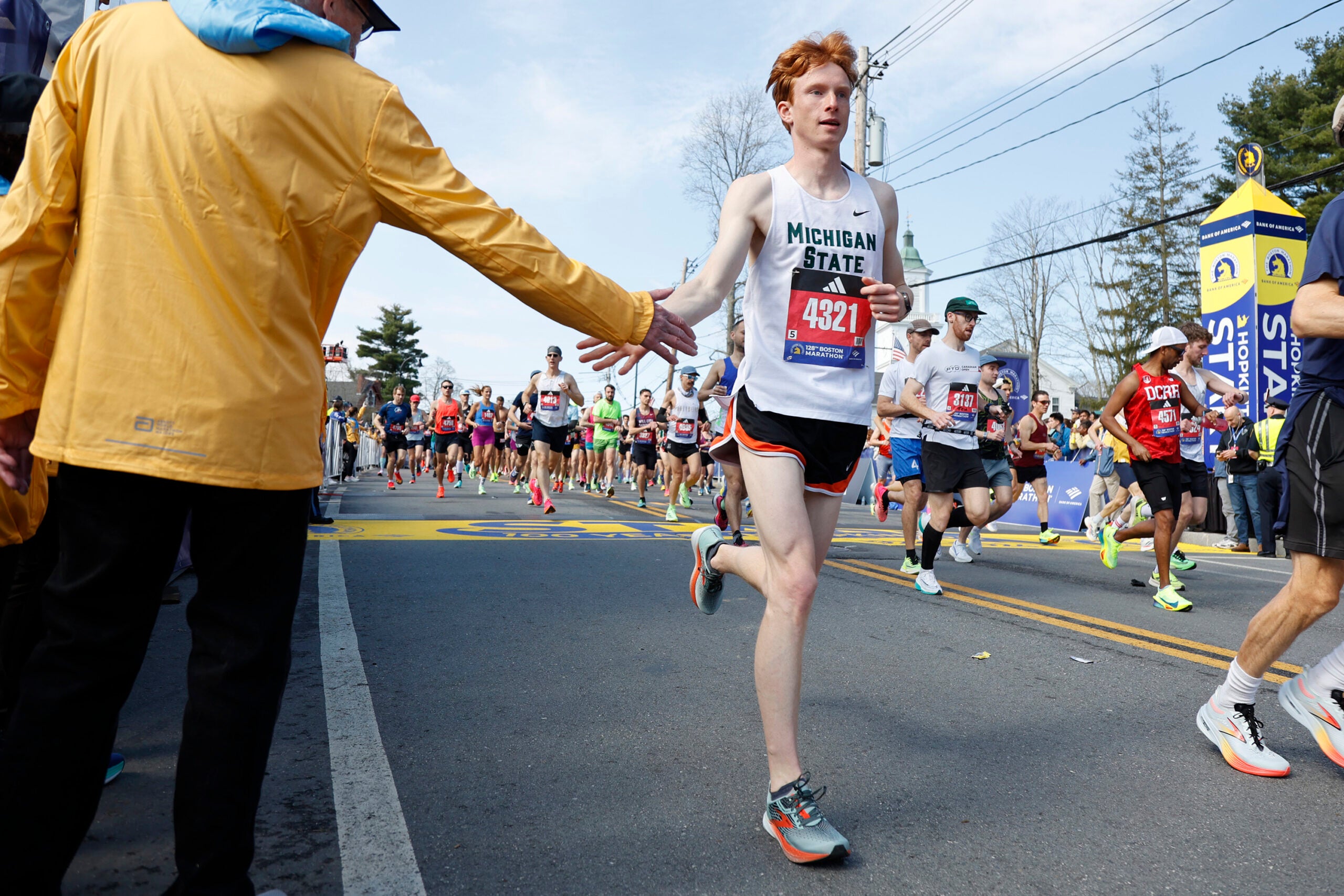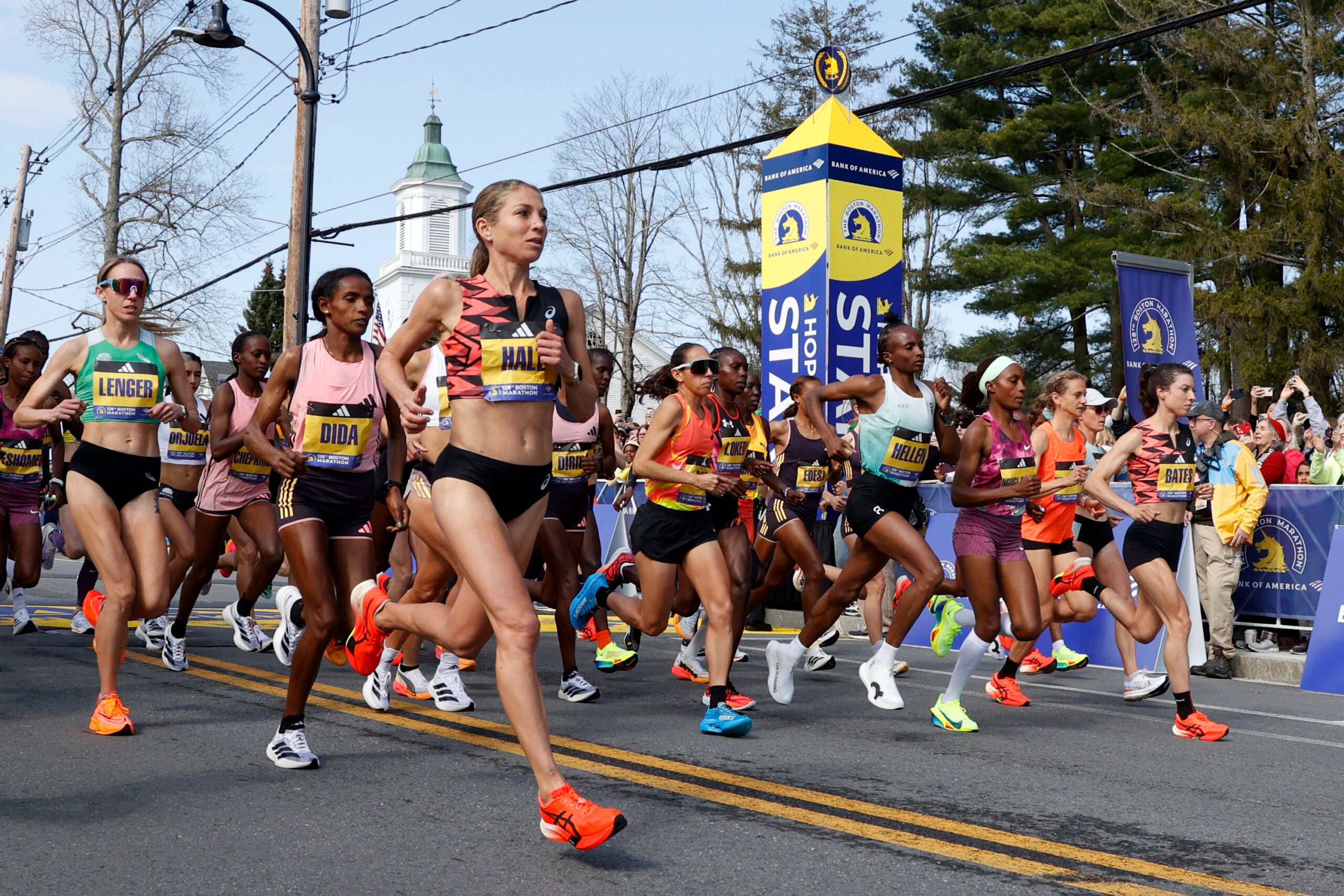Sign up for the latest Boston Marathon updates
👟 Everything you need to know about Marathon Monday, delivered to your inbox.

If you’re still buzzing from the excitement of watching this year’s Boston Marathon and considering joining the runners come Marathon Monday 2025, you’ll want to start your training journey on the right foot.
To get you started, we asked runners of this year’s race what advice they would give to first-time marathoners.
Chris Herbs, running coach and physical therapist at Boston Physical Therapy & Wellness, was one of several runners who shared some expertise. He recommended starting slow, maintaining an even effort rather than an even pace on uphills, and practicing a fueling strategy for race day. Every good runner has a game plan, he said, but don’t sweat the small stuff.
“Don’t try anything new on race day. Everything from your fueling plan to the clothes you wear should be tested out during training runs,” he said. “Try to relax. Stay hydrated, carb load, get a good night’s sleep in the nights leading up to the race, and don’t exert too much energy in the days leading up to the race, but don’t drive yourself crazy trying to make things perfect. Having a beer, eating a comfort meal, or spending time with family and friends in the days leading up to the race probably won’t make or break your race, but stressing things might!”
Elizabeth Pehota, a 2024 Boston Marathon runner, had some Boston-specific marathon reminders to share, particularly about the deceptive trickiness of downhill running.
“While much emphasis is placed on training for the notorious hills of the Boston Marathon course, the importance of mastering downhill running often goes overlooked. Surprisingly, Boston is primarily a net-downhill course, with significant elevation loss occurring in the initial and final four miles, and a very steep downhill at Mile 15,” she said. “Don’t let gravity simply carry you down. You need to control your speed so you don’t tire out later in the race. By approaching downhill sections conservatively, you’ll preserve valuable energy for navigating the challenging Newton Hills and Heartbreak Hill later in the race!”
But above all, the eight-time marathoner wants to remind newcomers to savor the moment: “When you turn onto Boylston Street, that’s your time to shine. Give it everything you have, remember your why, and let that carry you to the finish. It’s a truly emotional and transformative experience, and this is your time to take it all in!”
Read on from more tips and tricks from dozens of marathon runners about how to start — and finish — your marathon journey.
Responses have been lightly edited for length and clarity.

“As I prepared for the 2024 Boston Marathon, I learned firsthand that listening to my body was paramount. Acknowledging that sometimes less was more, I avoided overexertion, prioritizing rest when needed to prevent potential setbacks. By striking a balance between pushing boundaries and respecting limits, I fostered a healthier, sustainable approach to achieving my marathon goals. Additionally, understanding my body’s unique needs regarding nutrition and hydration was instrumental. By calculating my ‘sweat rate,’ I ensured optimal hydration during long runs, supporting muscle function and maintaining resilience throughout training and race day. Good luck to all the new runners — you will do great!” — Michaela P., Boston
“I learned a lot about running the hard way. I would recommend getting a coach or getting a fitness app to follow. I didn’t follow a training plan my first two months of training and realized I was not doing everything that I should have been doing up until that point. I could have been utilizing my time better if I knew what I know now.” — Vincent E., Yarmouth
“You want to be able to run 26.2 the day of the marathon so often less is more when training! Don’t be too strict with your training schedule, rest and/or do less mileage when your body needs it. Keep up with your weekly long run progression but don’t overtrain during the week!” — Danielle V., West Roxbury
“Don’t neglect strength training! It can be just once a week, but be consistent. And be sure to study the course map before race day! It’s a huge game changer to know exactly what to expect mile by mile. And HAVE FUN! Especially for the first one, the goal should just be to finish and smile as much as possible. Your first marathon is so electric you’re going to want to just soak it all in!” — Tatiana C., Wellesley
“My advice would be to celebrate the small victories throughout training. Each new long run is an accomplishment on its own. Training is vigorous and can suck a lot of you, but remember to enjoy each step (literally) along the way. There’s no feeling in the world like crossing the finish line after 26.2. Try and treat each small achievement the same way — be proud of yourself from start to finish.” — Siobhan G., South Boston
“Remember to enjoy the experience of running and the sense of accomplishment it brings. Find joy in the process rather than just focusing on the end goal. Enjoy every run that gets you progressively closer to that 26.2 mile goal, whether it’s running with friends, listening to music you love, escaping into a great audiobook or exploring a new part of the city. Enjoy the journey and your destination will sneak up on you before you know it!” — Veronica B., Brighton
“Don’t spend weeks before the run stressing about something that probably won’t happen, or if it might happen, will just take a minute to solve. When it is all said and done, you will look back and realize how much energy you wasted, stressing about all the things which never happened.” — Gary A., Camas, Wash.

“For Boston (and others), definitely do not go out too fast. The temptation is there in Boston due to the fact it is downhill for quite a bit. It is also downhill after you get over Heartbreak Hill. Resist the temptation and save your legs!” — Steven N., Charlton
“Paul Simon famously sang, ‘When I think back on all the crap I learned in high school, it’s a wonder, I can think at all!’ Sometimes, the habits you learned early on are the exact opposite of what you should do. This advice comes to mind when it comes to running your first marathon. If you’re like me, maybe you ran cross-country in high school. How did you learn how to run? In my case, we were told to go out as fast as you could, and then to hold that pace for as long as possible. And that’s what we all did!
“It turns out that you should do the exact opposite. The best runners restrain themselves in the first several miles. The holy grail is what they call “negative splits.” Start slow, get faster, and end strong. It helps you conserve energy. It builds a positive feedback loop, as you find yourself passing other runners later in the race. And it keeps you below your lactate threshold, which helps you reduce the risk of lactic acid accumulating in your legs. As was the case in many songs, Paul Simon had it right!” — Benjamin G., Palm Beach, Fla.
“When it gets tough out there on the marathon course, I recommend that you think of your WHY. Why have you been training for months for this race? Who can you dedicate your miles to?” — Amy C., Chestnut Hill
“The marathon tests you mentally as much as physically. Have a mantra or a few! Also, focus on the journey, not the result. It is all an experience and amazing that you’re able to run.” — Jennifer J., Shrewsbury
“There may be moments when the race will seem hard and you may feel like you can’t finish or don’t want to. Remember, it’s supposed to be hard, but your mind is stronger than what your body feels. You can and will make it to the finish line.” — Tonya B., Houston
“No matter how much training you’ve put into race day, there will be times along the course that feel hard. Try to remember how you’re feeling in any given moment isn’t how you will feel the whole 26.2 miles! Try to channel the reason “why” you started when things get hard. The feeling of accomplishment when you finish will be worth it!” — Amy C., Beverly
“Get the water every time it is offered to you, even if you just take one sip! Boston is very generous with their water stations — take advantage of it!” — Shannon B., Sudbury
“My advice for someone who wants to run their marathon is to hydrate early and often. Do not underestimate the importance of hydration and nutrition during the race. I have completed 10 marathons and, trust me, my very first marathon I knew nothing about hydration and completely hit the wall at mile 19. I recommend drinking infused water every mile and taking a gel every three to four miles to make sure you keep your body hydrated and fueled to finish the marathon with style and grace!” — Elvin A., New York City
“The best running advice anyone ever gave to me is to walk through the water stops. Chances are, if you’re running through water stops, you’re likely spilling half of the water all over yourself and not getting in the proper amount of hydration. So leave drinking water while running to the professionals. Enjoy the experience of running (and walking) the Boston Marathon!” — Chris M., Grafton
“Runners instinctively are their worst enemies. Do not compare yourself to anyone else, make small and big goals in the background to work towards and complete them … We sometimes only think with our runner’s brains: ‘I must hit this mileage or this pace, I’m so slow, I can never run a marathon.’ Think back to the overall goal when these negative thoughts happen. The first marathon initially seems so large and impossible until you get to the start line and the adrenaline kicks in and your hard work starts taking you away until eventually … you’re a marathoner now. Nobody said it would be easy.” — Jeff, Newton
“Speaking to the folks who are a ‘back of the pack’ runner like me who has never finished under the six hour cutoff time, be prepared for the ‘consequences’ of having the course being disassembled as you go. The water stations will be picked up and unstaffed, meaning you’ll need to conserve water and/or hydration, and you may need to grab a couple of bottles from well-meaning spectators. You may also wind up ‘sidewalk running’ when they pull up the barriers and open up the roads for traffic again. Running is always a solo activity, but prepare yourself to run without the crowds to carry you. That is, until you get to Boylston, where they reappear to bring you home.” — Chris D., Whitman
“Toeing the line in Hopkinton is the start of a 26.2-mile victory lap after many months and hundreds of miles of preparation. Trust your training. Soak in the energy of the spectators and other runners. Have fun! Savor the finish. If the going gets tough, remember that you are among the privileged few who get to run the world’s oldest annual marathon.” — Christine M., Boston
“Try to soak in the feeling of being on the course as much as possible because even though you’ve got 26.2 miles to go, it will go by quickly! You have just spent months training and you deserve to acknowledge how much effort you’ve put in to get yourself on the course. Take a moment for yourself to be proud of what you’re accomplishing!” — Mairead, Boston
“It sounds super cliche but you really have to be in the moment. I spent too much time my first marathon focusing on the wrong things. Boston is the most iconic marathon race — soak in every moment! Enjoy your surroundings, be energized by the spectators, hug your family as you run past your personal cheer squads, take pictures of the moments that matter, stop at the bombing statue and reflect, pose for the official pictures! It’s a bucket list race so don’t miss one moment of the experience to shave off five minutes off your time. Those minutes are better served in the memories you will keep long after the race is over.” — Rashida S., Hyde Park

“Lubricate the groin area. If you forget to do this and end up starting the race without your Vaseline or Body-Glide, get it at the first medical tent or from anyone else who offers it to you on the course. Protect the nipples. If you’re a guy wearing a loose fitting shirt, you better put bandages over your nipples or they will become a painful, bloody mess. I prefer a tight-fitting stretchy Dri-Fit shirt or no shirt at all (weather permitting). This is no joke!
“You don’t want to race with a full stomach or have to stop on the course to drop a deuce. My preferred breakfast two hours before race start is a banana (good source of potassium to help fight potential leg cramps) and a cup of ramen noodles (high carbs for energy and high sodium to help your body retain the fluids you’ll be drinking on the course). Make sure you drink the broth! It’s the equivalent of a salt pill.
“Don’t try anything new on race day. That means no new shoes, socks, food, power gels, etc. There are many things out of your control that can go wrong when you run a marathon. You need to control the things you can and go with what has worked for you in training.
“Write your name on your arm or the front of your shirt (with a permanent marker) large enough for spectators to read. They will shout your name and encourage you throughout the race. A needed pick-me-up during the later miles. Also It’s hard to walk when someone is cheering for you by name.” — Jeff B., South Carolina
“Stop putting it off. Bite the bullet, and register. It’s overwhelming and the training is time consuming. But it’s been one of the most rewarding experiences of my life so far. You can do hard things!” — Kristen G., Longmeadow
👟 Everything you need to know about Marathon Monday, delivered to your inbox.
Stay up to date with everything Boston. Receive the latest news and breaking updates, straight from our newsroom to your inbox.
Be civil. Be kind.
Read our full community guidelines.